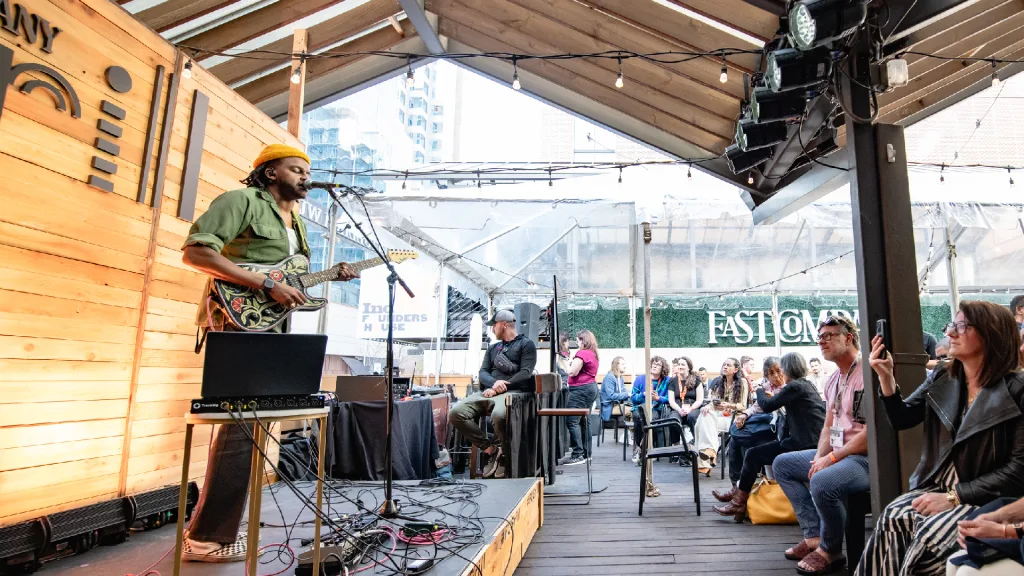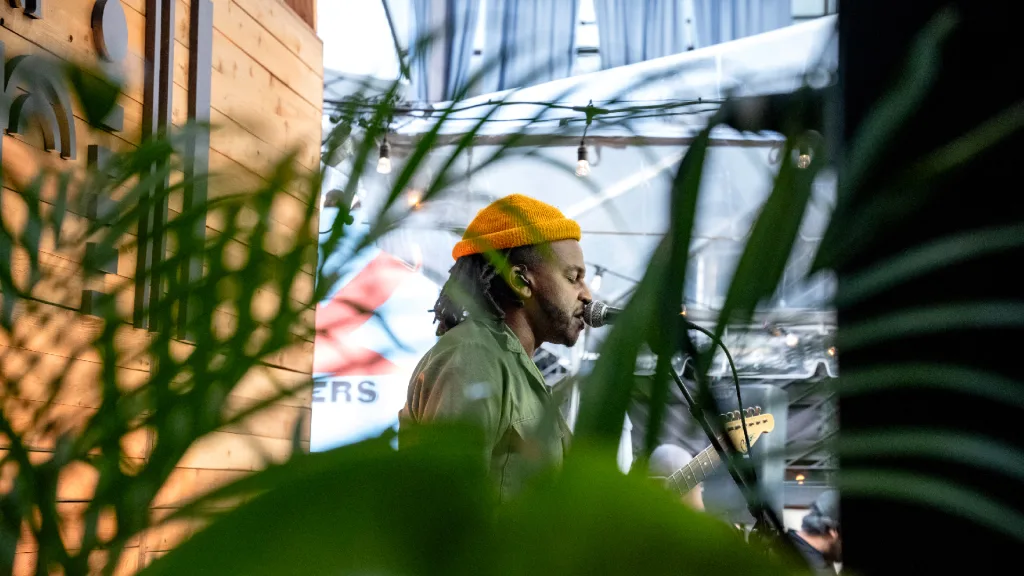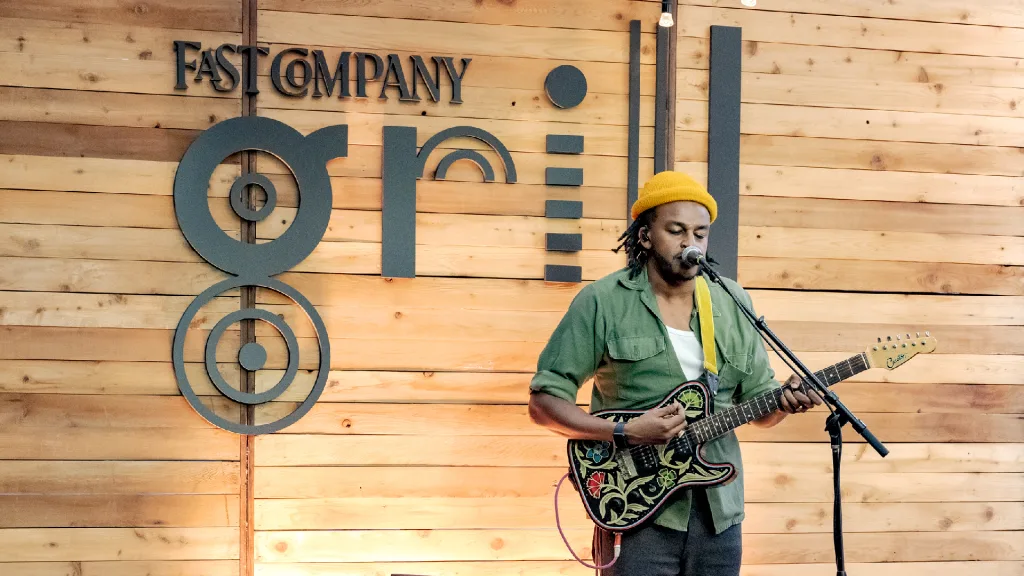Sinkane’s new album, ‘We Belong,’ is a love letter to Black culture
Sinkane’s new album, ‘We Belong,’ is a love letter to Black culture
Sudanese-American musician Ahmed Gallab, aka Sinkane, explains why his seminal new album, ‘We Belong,’ is for the culture—and for himself.
BY KC Ifeanyi
Ahmed Gallab’s music isn’t easy to define. But that’s less by design and more a product of his upbringing.
Better known as Sinkane, Gallab has spent his career exploring a patchwork of genres stretching from free jazz to prog rock and influences that trace back to the years he spent growing up in London, Sudan, and the United States. In his music, he draws inspiration from this background, while also untangling how it shapes his identity.
“Growing up in a lot of different places allowed me to really experience a lot of different things,” Gallab says. “People can’t define [my] music because I’ll be working on a song and it’ll remind me of something so out there, something that’s not really connected to what the song originally started out as. But it seems connected to me. I can understand why people would be confused by that because I was still figuring it out.”
With his eighth studio album, We Belong, Gallab has finally figured it out.
Gallab describes his latest project as a love letter to Black music, culture, and people. The album glides across the diaspora, paying homage to Afrobeats, reggae, disco, house, soul, and funk while centering narratives of the Black experience that, yes, include great suffering and pain but also undeniable joy. And as much as We Belong is a celebration of the kaleidoscope of Black culture, it also represents a significant shift for Gallab, both personally and professionally.
“It wasn’t until this album, We Belong, that I really figured out what my voice is and was able to connect all these seemingly disparate ideas, musical genres, musical tropes, and sounds into something that is unified, that sounds exactly like who I am,” Gallab says.
Earlier this month, Gallab closed out the Fast Company Grill at SXSW in Austin with a stellar performance. In a backstage interview, he explained how Sinkane has been like therapy for him, why he decided receive formal music training 16 years into his career, and his hope that We Belong can be some kind of balm to the “dumpster fire” of life right now.

Sinkane, the band, started in 2007, and it’s had a rotating cast of members ever since. How would you describe Sinkane?
Sinkane was initially my vehicle and sort of therapy for me to figure out my identity. I’d played in so many different bands that were collaborative and democratic for a very long time. All of those bands broke up, and it was time for me to figure out what I wanted to do next. And I thought, Why don’t I just create this musical sandbox where I can just do whatever I want and figure out who I am? I was like 22, 23 when I started the band. And it has since become this really amazing way for me to connect with people. It has helped me find my voice as a human and as a musician. And it’s a party. It’s really what it is. It’s just a big fat party.
Your music is such an extension of who you are. Why did you feel the need to create the name Sinkane in the first place as opposed to just using your own name?
That’s a really good question! I think maybe because it was this world I created, this other place. And it was a place that I went to to figure out who I was. It’s funny because there is a name for that world in my writing of music. I wrote a song on my album Mars called “Caparundi,” which was essentially this fictional world where anyone who felt lost could feel at home. Foreigners in a foreign land, this was their land.
The name Sinkane actually came out of mishearing a lyric in a Kanye West song [“Never Let Me Down”] back in 2006 where he was talking about Joseph Cinqué, the slave who led the Amistad revolt. I heard the lyric, “I’m tryin’ to give us, ‘us free’ like Cinqué,” as Sinkane. And to me, it sounded like this really wonderful and poetic African word that was the name of this African God who all of us should know about as Black people. And when I googled it, I realized I was wrong. It was Joseph Cinqué who was in his own right a wonderful person. And at that moment, I just figured maybe I should just be Sinkane. Maybe I should just start this thing.

From your first album Sinisterals to We Belong, how would you describe your evolution?
Oh, man. It was a journey. I feel like every album represents a facet of the world that I’m interested in. You can understand where I’m at in the present moment, whether it’s heartbreak or my relationship with my family or a new understanding of myself. It was all very existential up until now. I was very intellectual, heady intense, and brooding. I honestly feel like when I started Sinkane, I was this newborn. Eight records in, I’m now like this teenager. I’ve been doing this for almost 20 years now with Sinkane. I feel like I’m at that point in the evolution of a human being where you are figuring yourself out. You’re really like connecting the dots.
One review of We Belong said this was a “rebirth” for you. You’ve said this album is a love letter to Black people. It sounds like this is a seminal project. What does We Belong mean to you?
We Belong started out as a response to my last album, Dépaysé. The word dépaysé is a French word meaning to be disconnected, displaced from your surroundings—but in a good way, like being in that experience and learning from that experience. And that’s what my life has felt like. And I really dug into that idea and really connected to my relationship with religion, my family, my friends, being a third culture kid, and that kind of stuff. You can hear that in the sounds and in the lyrics, and it’s pretty dark and intense. I really needed to go deep into that. And what that did was it allowed me to stop questioning and stop rewriting that narrative on every album. And I became interested in things outside of myself.
In what way?
I was so tired of this music that I was creating. I felt like it was getting too easy for me to write a Sinkane song. I needed new inspiration. I needed a new challenge. And I went to school [at SUNY Purchase]. I got a master’s in composition. It was the pandemic, so it was this perfect time for me to take a break. I needed distance from my music, from my band. So I went to school and that was the greatest thing I could have ever done. I was able to learn the science of music and really tap into these ideas that I’ve had my whole life. That really opened the floodgates for me and allowed me to do things that I don’t think I could have ever done. That’s what got me really interested in modern music, like Afrobeats, Black music from the U.K.: Ezra Collective and Moses Boyd, and Hollie Cook. It got me deeper into modern dance hall, classic soul, R&B, and gospel music, and jazz.
I was able to really understand the language. I would bring all this music to school, and we’d analyze it and I’d figure it out. It was my job to excavate the science of this music and implement those ideas and those theories into what I was doing. It took me so far away from what I used to do, which was just listen to music and understand it in my own way, and then reappropriate it the way that I did.

What was your training before going to school?
Nothing. I didn’t know how to read music before. I didn’t know how to write music, notate it, or any of that kind of stuff. I learned it all. I was this 38-year-old with 19-year-old kids in music theory class learning all this. And I was just like a sponge.
Where do you see your place in music today? When you look at the current landscape of music, where would you say your place in that landscape is—or do you even think about that at all?
I don’t. It’s hard to think about that and not feel full of yourself, you know? All I know is that the process of this album started off with me not thinking about myself and looking outside of myself. I went back to school. I dug deep into the history of Black music. And through that, I was able to connect to it in a way that I don’t think I’ve ever been able to. And naturally, if you’re writing music that’s inspired by all this stuff, you’re going to speak on the subjects that all of these amazing, legendary artists speak on. Sly Stone and Fela and Bob Marley, Parliament-Funkadelic—all these people who really inspired me to make this music—they talk about the Black experience.
In that, I was able to connect with myself as a Black person a lot stronger than I think I could have ever connected. And funnily enough, the experience of going outside of myself to create this album really allowed me to feel more connected internally, more grounded. So We Belong is about us as Black people. We all belong. We deserve to be here. We are a part of the greater landscape of the world. But it also has allowed me to understand that I belong. All of this time that I’m searching and asking all these questions through my music, I now feel settled. I’ve created a resolve in my life and in my musical journey that didn’t exist before. So I don’t know if I can see beyond.
What do you hope We Belong will accomplish in the broader sense?
I am here to connect with people. I love it when people can listen to my music and have their own personal connection and relationship to it. Some people who loved Sinkane three albums ago might not connect with us now. But there will be maybe a hundred more people who do connect with Sinkane. My music is starting a conversation. It’s a game of tennis. I volleyed the ball over with these songs, and the crowd and my fans volley back. And that’s really exciting. And it’s the same with my band. I volley them this music, and they interpret it in a really wonderful way. And we just kind of play this really wonderful game back and forth. That’s all I can hope for, is to connect with people and to spread joy because life is really hard right now. We’re living in a dumpster fire, and I hope to allow people to experience a good time at our shows.
(16)



